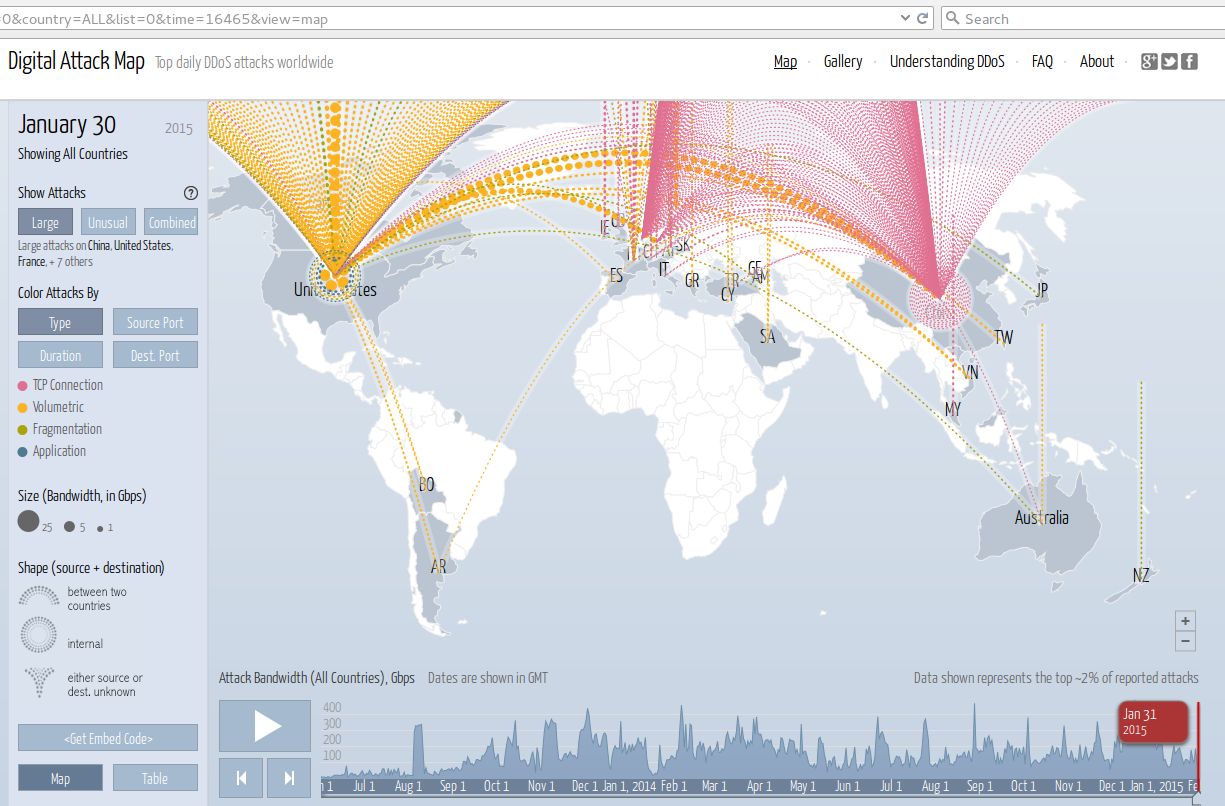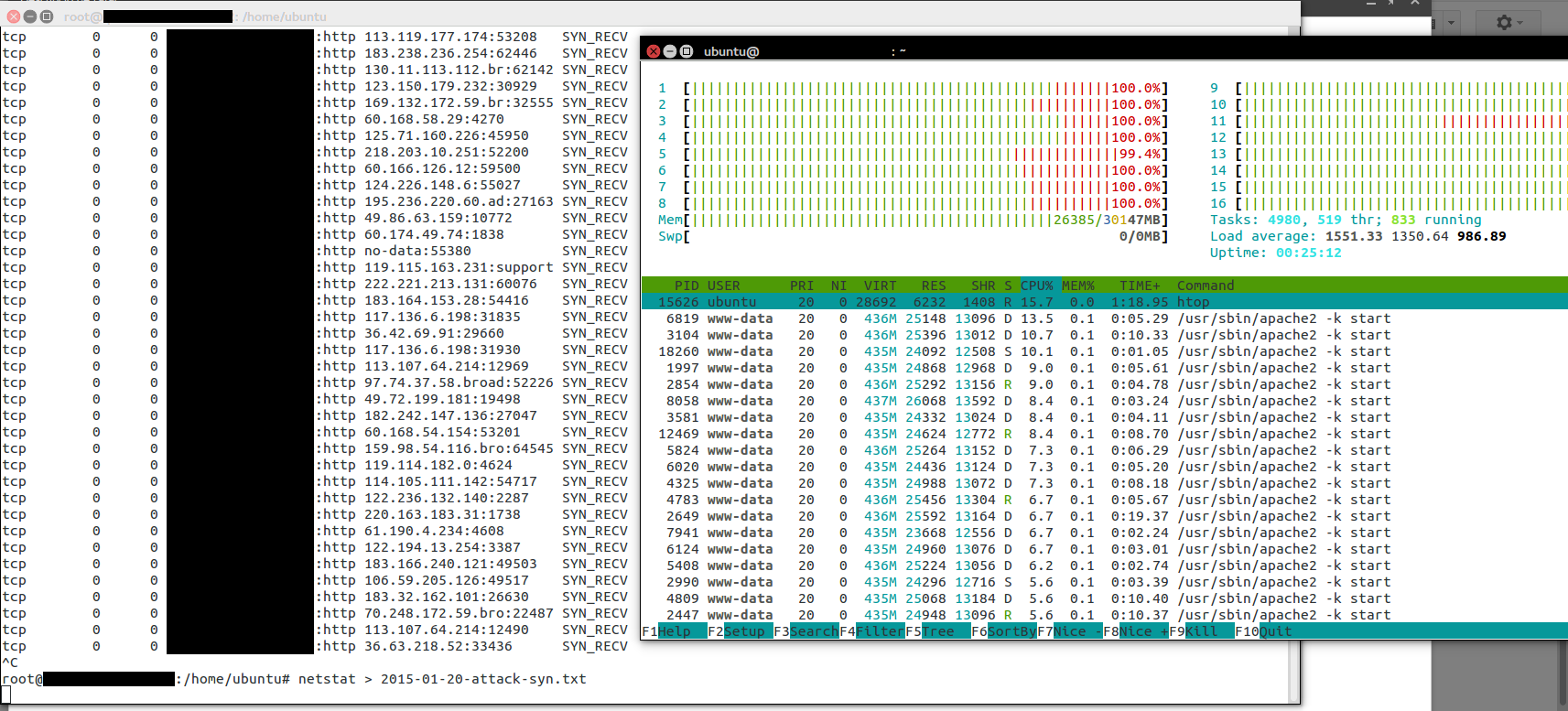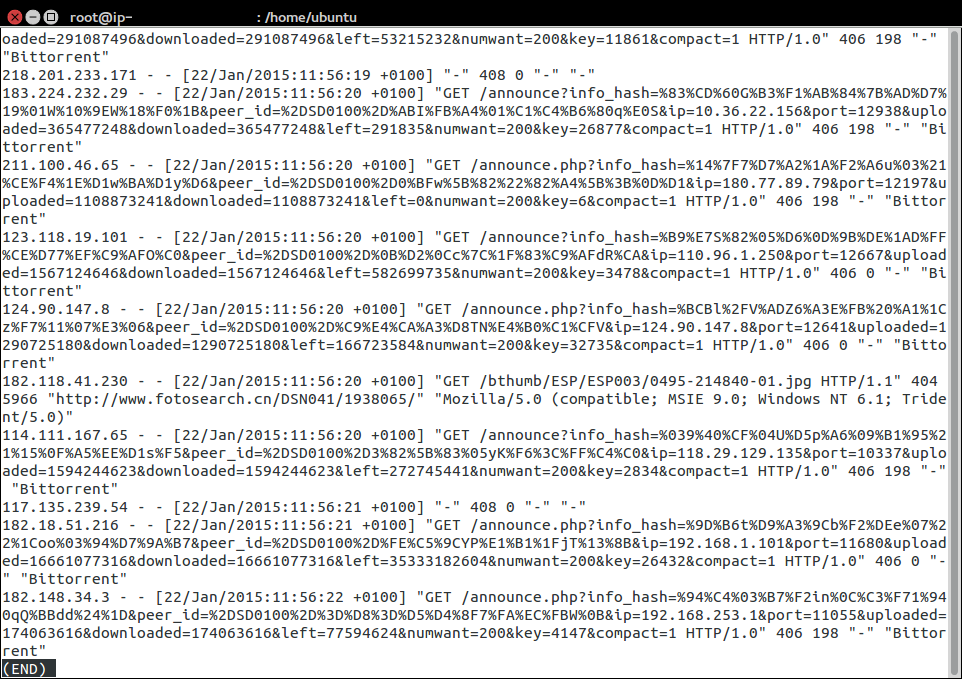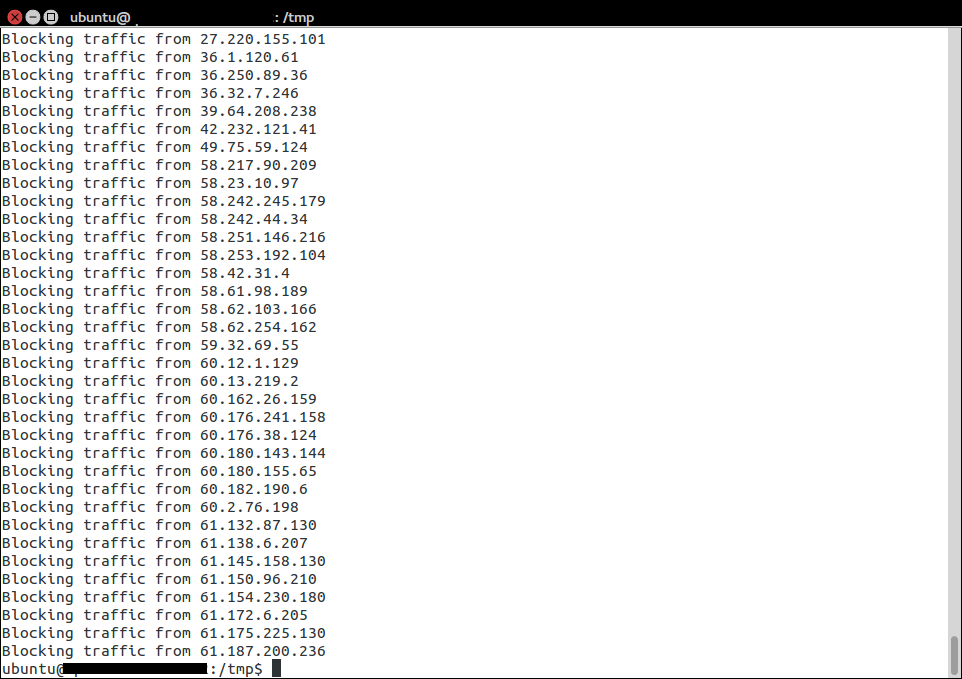I explain some final information and tricks and definitive guidance so you can totally stop the DDoS attacks affecting so many sites.
After effectively mitigating the previous DDoS Torrent attack to a point that was no longer harmful, even with thousands of requests, I had another surprise.
It was the morning when I had a brutal increase of the attacks and a savage spike of traffic and requests of different nature, so in addition to the BitTorent attack that never stopped but was harmful. I was on route to the work when the alarms raised into my smartphone. I stopped in a gas station, and started to fix it from the car, in the parking area.
Service was irresponsible, so first thing I did was to close the Firewall (from the Cloud provider panel) to HTTP and HTTPS to the Front Web Servers.
Immediately after that I was able to log in via SSH to the Servers. I tried to open HTTPS for our customers and I was surprised that most of the traffic was going through HTTPS. So I closed both, I called the CEO of the company to give status, and added a rule to the Firewall so the staff on the company would be able to work against the Backoffice Servers and browse the web while I was fixing all the mess. I also instructed my crew and gave instructions to support team to help the business users and to deal with customers issues while I was stopping the attack.
I saw a lot of new attacks in the access logs.
For example, requests like coming from Android SDK. Weird.
I blocked those by modifying the index.php (code in the previous article)
// Patch urgency Carles to stop an attack based on Torrent and exploiting sdk's
// http://blog.carlesmateo.com
if (isset($_GET['info_hash']) || (isset($_GET['format']) && isset($_GET['sdk'])) || (isset($_GET['format']) && isset($_GET['id']))) {
(Note: If your setup allows it and the HOST requested is another (attacks to ip), you can just check requestes HOST and block what’s different, or if not also implement an Apache rule to divert all the traffic to that route (like /announce for Bittorrent attack) to another file.)
Then, with the cron blocking the ip addresses all improved.
Problem was that I was receiving thousands of requests per second, and so, adding those thousands of Ip’s to IPTABLES was not efficient, in fact was so slow, that the process was taking more than an hour. The server continued overwhelmed with thousands of new ip’s per second while it was able to manage to block few per second (and with a performance adding ip’s degraded since the ip number 5,000). It was not the right strategy to fight back this attack.
Some examples of weird traffic over the http logs:
119.63.196.31 - - [01/Feb/2015:06:54:12 +0100] "GET /video/iiiOqybRvsM/images/av atar/0097.jpg HTTP/1.1" 404 499 "-" "Baiduspider-image+(+http://www.baidu.com/se arch/spider.htm)\\nReferer: http://image.baidu.com/i?ct=503316480&z=0&tn=baiduim agedetail" 119.63.196.126 - - [01/Feb/2015:07:15:48 +0100] "GET /video/Ig3ebdqswQI/images/avatar/0114.jpg HTTP/1.1" 404 499 "-" "Baiduspider-image+(+http://www.baidu.com/search/spider.htm)\\nReferer: http://image.baidu.com/i?ct=503316480&z=0&tn=baiduimagedetail" 180.153.206.20 - - [30/Jan/2015:06:34:34 +0100] "GET /contents/all/tokusyu/skin_detail.html HTTP/1.1" 404 492 "-" "Mozilla/4.0" 180.153.206.20 - - [30/Jan/2015:06:34:35 +0100] "GET /contents/gift/ban_gift/skin_gift.js HTTP/1.1" 404 490 "http://top.dhc.co.jp/contents/gift/ban_gift/skin_gift.js" "Mozilla/4.0" 180.153.206.20 - - [30/Jan/2015:06:34:36 +0100] "GET /contents/all/content/skin.js HTTP/1.1" 404 483 "http://top.dhc.co.jp/contents/all/content/skin.js" "Mozilla/4.0 220.181.108.105 - - [30/Jan/2015:06:35:22 +0100] "GET /image/DbLiteGraphic/201405/thumb_14773360.jpg?1414567871 HTTP/1.1" 404 505 "http://image.baidu.com/i?ct=503316480&z=0&tn=baiduimagedetail" "Baiduspider-image+(+http://www.baidu.com/search/spider.htm)" 118.249.207.5 - - [30/Jan/2015:06:39:26 +0100] "GET /widgets.js HTTP/1.1" 404 0 "http://www.javlibrary.com/cn/vl_star.php?&mode=&s=azgcg&page=2" "Mozilla/5.0 (MSIE 9.0; qdesk 2.4.1266.203; Windows NT 6.1; WOW64; Trident/7.0; rv:11.0; QQBrowser/8.0.3197.400) like Gecko" 120.197.109.101 - - [30/Jan/2015:06:57:20 +0100] "GET /ads/2015/20minutes/publishing/stval/3001.html?pos=6 HTTP/1.1" 404 542 "-" "20minv3/6 CFNetwork/609.1.4 Darwin/13.0.0" 101.226.33.221 - - [30/Jan/2015:07:00:04 +0100] "GET /?LR_PUBLISHER_ID=29877&LR_SCHEMA=vast2-vpaid&LR_PARTNERS=758858&LR_CONTENT=1&LR_AUTOPLAY=1&LR_URL=http://play.retroogames.com/penguin-hockey-lite/?pc1oibq9f5&utm_source=4207933&entId=7a6c6f60cd27700031f2802842eb2457b46e15c0 HTTP/1.1" 200 11783 "http://play.retroogames.com/penguin-hockey-lite/?pc1oibq9f5&utm_source=4207933&entId=7a6c6f60cd27700031f2802842eb2457b46e15c0" "Mozilla/4.0" 180.153.206.20 - - [30/Jan/2015:07:03:10 +0100] "GET /?metric=csync&p=3030&s=6109924323866574861 HTTP/1.1" 200 11783 "http://v.youku.com/v_show/id_XODYzNzA0NTk2.html" "Mozilla/4.0" 180.153.114.199 - - [30/Jan/2015:07:05:18 +0100] "GET /?LR_PUBLISHER_ID=78817&LR_SCHEMA=vast2-vpaid&LR_PARTNERS=763110&LR_CONTENT=1&LR_AUTOPLAY=1&LR_URL=http://www.dnd.com.pk/free-download-malala-malala-yousafzai HTTP/1.1" 200 11783 "http://www.dnd.com.pk/free-download-malala-malala-yousafzai" "Mozilla/4.0" 60.185.249.230 - - [30/Jan/2015:07:08:20 +0100] "GET /scrape.php?info_hash=8%e3Q%9a%9c%85%bc%e3%1d%14%213wNi3%28%e9%f0. HTTP/1.1" 404 459 "-" "Transmission/2.77" 180.153.236.129 - - [30/Jan/2015:07:11:10 +0100] "GET /c/lf-centennial-services-hong-kong-limited/hk041664/ HTTP/1.1" 404 545 "http://hk.kompass.com/c/lf-centennial-services-hong-kong-limited/hk041664/" "Mozilla/5.0 (compatible; MSIE 9.0; Windows NT 6.1; Trident/5.0); 360Spider(compatible; HaosouSpider; http://www.haosou.com/help/help_3_2.html)" 36.106.38.13 - - [30/Jan/2015:07:18:28 +0100] "GET /op/icon?id=com.wsw.en.gm.ArrowDefense HTTP/1.1" 404 0 "-" "Apache-HttpClient/UNAVAILABLE (java 1.4)" 180.153.114.199 - - [30/Jan/2015:07:19:12 +0100] "GET /?metric=csync&p=3030&s=6109985239380459533 HTTP/1.1" 200 11783 "http://vox-static.liverail.com/swf/v4/admanager.swf" "Mozilla/4.0" 180.153.206.20 - - [30/Jan/2015:07:39:56 +0100] "GET /?metric=csync HTTP/1.1" 20 0 11783 "http://3294027.fls.doubleclick.net/activityi;src=3294027;type=krde;cat= krde_060;ord=94170148950.07014?" "Mozilla/4.0" 220.181.108.139 - - [30/Jan/2015:07:47:08 +0100] "GET /asset/assetId/5994450/size/large/ts/1408882797/type/library/client/WD-KJLAK/5994450_large.jpg?token=4e703a62ec08791e2b91ec1731be0d13&category=pres&action=thumb HTTP/1.1" 404 550 "http://www.passion-nyc.com/" "Baiduspider-image+(+http://www.baidu.com/search/spider.htm)"
And over HTTPS:
120.197.26.43 - - [29/Jan/2015:00:04:25 +0100] "GET /c/5356/cc.js?ns=_cc5356 HTTP/1.1" 404 11676 "http://m.accuweather.com/zh/cn/guangzhou/102255/current-weather/102255?p=huawei2" "HUAWEI Y325-T00_TD/V1 Linux/3.4.5 Android/2.3.6 Release/03.26.2013 Browser/AppleWebKit533.1 Mobile Safari/533.1;" 120.197.26.43 - - [29/Jan/2015:00:05:32 +0100] "GET /c/5356/cc.js?ns=_cc5356 HTTP/1.1" 404 11674 "http://m.accuweather.com/zh/cn/guangzhou/102255/weather-forecast/102255" "HUAWEI Y325-T00_TD/V1 Linux/3.4.5 Android/2.3.6 Release/03.26.2013 Browser/AppleWebKit533.1 Mobile Safari/533.1;" 117.136.1.106 - - [29/Jan/2015:06:35:05 +0100] "GET /v2.2/237613769760602?format=json&sdk=android&fields=supports_attribution%2Csupports_implicit_sdk_logging%2Cgdpv4_nux_content%2Cgdpv4_nux_enabled%2Candroid_dialog_configs HTTP/1.1" 404 6304 "-" "FBAndroidSDK.3.20.0" 117.136.1.106 - - [29/Jan/2015:06:35:11 +0100] "GET /v2.2/237613769760602?format=json&sdk=android&fields=supports_attribution%2Csupports_implicit_sdk_logging%2Cgdpv4_nux_content%2Cgdpv4_nux_enabled%2Candroid_dialog_configs HTTP/1.1" 404 6308 "-" "FBAndroidSDK.3.20.0" 117.136.1.107 - - [29/Jan/2015:06:35:36 +0100] "GET /v2.2/1493038024241481?fields=name,supports_implicit_sdk_logging,gdpv4_nux_enabled,gdpv4_nux_content,ios_dialog_configs,app_events_feature_bitmask&format=json&sdk=ios HTTP/1.1" 404 6731 "-" "FBiOSSDK.3.22.0" 180.175.55.177 - public [29/Jan/2015:07:40:23 +0100] "GET /public/checksum?a=8&t=p&v=2.5.0&c=d62c8d04f74057d51872d5dc5cdab098 HTTP/1.0" 404 39668 "https://rc-regkeytool.appspot.com/public/checksum?a=8&t=p&v=2.5.0&c=d62c8d04f74057d51872d5dc5cdab098" "Mozilla/5.0 (iPhone; U; CPU like Mac OS X; en) AppleWebKit/420+ (KHTML, like Gecko) Version/3.0 Mobile/1C28 Safari/419.3"
So, I was seeing requests that typically do applications like Facebook, smartphones with Android going to google store, and a lot of other applications and sites traffics, that was going diverted to my Ip.
So I saw that this attack was an attack associated to the ip address. I could change the ip in an extreme case and gain some hours to react.
So if those requests were coming from legitimate applications I saw two possibilities:
1. A zombie network controlled by pirates through malware/virus, that changes the /etc/hosts so those devices go to my ip address. Unlikely scenario, as there was a lot of mobile traffic and is not the easiest target of those attacks
2. A Dns Spoofing attack targeting our ip’s
That is an attack that cheats to Dns servers to make them believe that a name resolves to a different ip. (that’s why ssl certificates are so important, and the warnings that the browser raises if the server doesn’t send the right certificate, it allows you to detect that you’re connecting to a fake/evil server and avoid logging etc… if you have been directed a bad ip by a dns poisoned)
I added some traces to get more information, basically I dump the $_SERVER to a file:
$s_server_dump = var_export($_SERVER, true);
file_put_contents($s_debug_log_file, $s_server_dump.”\n”, FILE_APPEND | LOCK_EX);
array ( 'REDIRECT_SCRIPT_URL' => '/announce', 'REDIRECT_SCRIPT_URI' => 'http://jonnyfavorite3.appspot.com/announce', 'REDIRECT_STATUS' => '200', 'SCRIPT_URL' => '/announce', 'SCRIPT_URI' => 'http://jonnyfavorite3.appspot.com/announce', 'HTTP_HOST' => 'jonnyfavorite3.appspot.com', 'HTTP_USER_AGENT' => 'Bittorrent', 'HTTP_ACCEPT' => '*/*', 'HTTP_CONNECTION' => 'closed', 'PATH' => '/usr/local/sbin:/usr/local/bin:/usr/sbin:/usr/bin:/sbin:/bin', 'SERVER_SIGNATURE' => '<address>Apache/2.4.7 (Ubuntu) Server at jonnyfavorite3.appspot.com Port 80</address>', 'SERVER_SOFTWARE' => 'Apache/2.4.7 (Ubuntu)', 'SERVER_NAME' => 'jonnyfavorite3.appspot.com', 'SERVER_ADDR' => 'deleted', 'SERVER_PORT' => '80', 'REMOTE_ADDR' => '60.219.115.77', 'DOCUMENT_ROOT' => 'deleted', 'REQUEST_SCHEME' => 'http', 'CONTEXT_PREFIX' => '', 'CONTEXT_DOCUMENT_ROOT' => 'deleted', 'SERVER_ADMIN' => 'deleted', 'SCRIPT_FILENAME' => 'deleted', 'REMOTE_PORT' => '27361', 'REDIRECT_QUERY_STRING' => 'info_hash=%26%27%0F%C2%EB%03J%E2%1F%B0%28%2B%29d%7C%8C%FE%C8l%E9&peer_id=%2DSD0100%2Dj%7E%C3%1C%14%FFsj%DA9%0B%27&ip=10.155.31.47&port=9978&uploaded=2244978664&downloaded=2244978664&left=2570039513&numwant=200&key=511&compact=1', 'REDIRECT_URL' => '/announce', 'GATEWAY_INTERFACE' => 'CGI/1.1', 'SERVER_PROTOCOL' => 'HTTP/1.0', 'REQUEST_METHOD' => 'GET', 'QUERY_STRING' => 'info_hash=%26%27%0F%C2%EB%03J%E2%1F%B0%28%2B%29d%7C%8C%FE%C8l%E9&peer_id=%2DSD0100%2Dj%7E%C3%1C%14%FFsj%DA9%0B%27&ip=10.155.31.47&port=9978&uploaded=2244978664&downloaded=2244978664&left=2570039513&numwant=200&key=511&compact=1', 'REQUEST_URI' => '/announce?info_hash=%26%27%0F%C2%EB%03J%E2%1F%B0%28%2B%29d%7C%8C%FE%C8l%E9&peer_id=%2DSD0100%2Dj%7E%C3%1C%14%FFsj%DA9%0B%27&ip=10.155.31.47&port=9978&uploaded=2244978664&downloaded=2244978664&left=2570039513&numwant=200&key=511&compact=1', 'SCRIPT_NAME' => '/index.php', 'PHP_SELF' => '/index.php', 'REQUEST_TIME_FLOAT' => 1422528394.036, 'REQUEST_TIME' => 1422528394, )
Some fields were replaced with ‘deleted’ for security.
Ok, so the client was sending a HOST header
jonnyfavorite3.appspot.com
This address resolves as:
ping jonnyfavorite3.appspot.com PING appspot.l.google.com (74.125.24.141) 56(84) bytes of data. 64 bytes from de-in-f141.1e100.net (74.125.24.141): icmp_seq=1 ttl=52 time=1.53 ms
So to google appspot.
Next one:
array ( 'REDIRECT_SCRIPT_URL' => '/v2.2/1493038024241481', 'REDIRECT_SCRIPT_URI' => 'https://graph.facebook.com/v2.2/1493038024241481', 'REDIRECT_HTTPS' => 'on', 'REDIRECT_SSL_TLS_SNI' => 'graph.facebook.com', 'REDIRECT_STATUS' => '200', 'SCRIPT_URL' => '/v2.2/1493038024241481', 'SCRIPT_URI' => 'https://graph.facebook.com/v2.2/1493038024241481', 'HTTPS' => 'on', 'SSL_TLS_SNI' => 'graph.facebook.com', 'HTTP_HOST' => 'graph.facebook.com', 'HTTP_ACCEPT_ENCODING' => 'gzip, deflate', 'CONTENT_TYPE' => 'multipart/form-data; boundary=3i2ndDfv2rTHiSisAbouNdArYfORhtTPEefj3q2f', 'HTTP_ACCEPT_LANGUAGE' => 'zh-cn', 'HTTP_CONNECTION' => 'keep-alive', 'HTTP_ACCEPT' => '*/*', 'HTTP_USER_AGENT' => 'FBiOSSDK.3.22.0', 'PATH' => '/usr/local/sbin:/usr/local/bin:/usr/sbin:/usr/bin:/sbin:/bin', 'SERVER_SIGNATURE' => '<address>Apache/2.4.7 (Ubuntu) Server at graph.facebook.com Port 443</address>', 'SERVER_SOFTWARE' => 'Apache/2.4.7 (Ubuntu)', 'SERVER_NAME' => 'graph.facebook.com', 'SERVER_ADDR' => 'deleted', 'SERVER_PORT' => '443', 'REMOTE_ADDR' => '223.100.159.96', 'DOCUMENT_ROOT' => 'deletd', 'REQUEST_SCHEME' => 'https', 'CONTEXT_PREFIX' => '', 'CONTEXT_DOCUMENT_ROOT' => 'deleted', 'SERVER_ADMIN' => 'deleted', 'SCRIPT_FILENAME' => 'deleted', 'REMOTE_PORT' => '24797', 'REDIRECT_QUERY_STRING' => 'fields=name,supports_implicit_sdk_logging,gdpv4_nux_enabled,gdpv4_nux_content,ios_dialog_configs,app_events_feature_bitmask&format=json&sdk=ios', 'REDIRECT_URL' => '/v2.2/1493038024241481', 'GATEWAY_INTERFACE' => 'CGI/1.1', 'SERVER_PROTOCOL' => 'HTTP/1.1', 'REQUEST_METHOD' => 'GET', 'QUERY_STRING' => 'fields=name,supports_implicit_sdk_logging,gdpv4_nux_enabled,gdpv4_nux_content,ios_dialog_configs,app_events_feature_bitmask&format=json&sdk=ios', 'REQUEST_URI' => '/v2.2/1493038024241481?fields=name,supports_implicit_sdk_logging,gdpv4_nux_enabled,gdpv4_nux_content,ios_dialog_configs,app_events_feature_bitmask&format=json&sdk=ios', 'SCRIPT_NAME' => '/index.php', 'PHP_SELF' => '/index.php', 'REQUEST_TIME_FLOAT' => 1422528399.4159999, 'REQUEST_TIME' => 1422528399, )
So that was it, connections were arriving to the Server/Load Balancer requesting addresses from Google, Facebook, thepiratebay main tracker, etc… tens of thousands of users simultaneously.
Clearly there was a kind of DNS spoofing attack. And looking at the ACCEPT_LANGUAGE I saw that clients were using Chineses language (zh-cn).
Changing the ip address will take some time, as some dns have 1 hour or several hours of TTL to improve page speed of customers, and both ip’s have to coexist for a while until all the client’s dns have refreshed, browsers have refreshed their cache of dns names, and dns of partners consuming our APIs have refreshed.
You can have a virtual host just blank, but for some projects your virtual hosts needs to listen for all the request, for example, imagine that you serve contents like barcelona.yourdomain.com and for newyork.yourdomain.com and whatever-changing.yourdomain.com like carlesmateo.yourdomaincom, anotheruser.yourdomain.com, anyuserwilhaveownurl.yourdomain.com, that your code process to get the information and render the pages, so it is not always possible to have a default one.
First thing I had to do was, as the attack came from the ip, was to do not allow any host requests that did not belong to the hosts served. That way my framework will not process any request that was not for the exact domains that I expect, and I will save the 404 process time.
Also, if the servers return a white page with few bytes (header), this will harm less the bandwidth if under a DDoS. The bandwidth available is one of the weak points when suffering a DDoS.
To block hosts that are not expected there are several things that can be done, for example:
- Nginx can easily block those requests not matching the hosts.
- Modify my script to look at
HTTP_HOST
So:
if (isset($_SERVER['HTTP_HOST']) && ($_SERVER['HTTP_HOST'] != 'www.mydomain.com' && $_SERVER['HTTP_HOST'] != 'mydomain.com') {
exit();
}
That way any request that is not for the exact domain will be halted quickly.
You can also check instead strpost($_SERVER['HTTP_HOST'], ‘mydomain.com’) for variable HTTP_HOST - Create an Apache default virtual host and default ssl. With a white page the load was so small that even tens of thousands ip’s cannot affect enough the server. (Max load was around 2.5%)
Optimization: If you want to save IOPS and network bandwidth to the storage you can create a ramdisk, and have the index.html of the default virtual host in there. This will increase server speed and reduce overhead.
If you’re in a hurry to stop the attack you can also:
- Change the Ip, get a new ip address, and change the dns to the new ip, and hope this one is not attacked
- An emergency solution, drastic but effective, would be to block entire China’s ip ranges.
Some of the webs I helped reported having attacks from outside China, but nothing related, the gross attacks, 99%, come from China.
Sadly Amazon’s Cloud Firewall does not allow to deny certain ip addresses, only allow services through a default deny policy.
I reopened the firewall in 80 and 443, so traffic to everyone, checked that the Service was Ok and continued my way to the office.
When later I spoke with some friends, one of them told me about the Chinese government firewall causing this sort of problems worldwide!. Look at this interesting article.
It is not clear if those DDoS attacks are caused by the Chinese Firewall, by a bug, or by pirates exploiting it to attack sites for money. But is clear that all those attacks and traffic comes from China ip addresses. Obviously this DNS issues are causing the guys browsing on China to not being able of browsing Facebook, WordPres, twitter, etc…
Here you can see live the origin of the world DDoS attacks:
http://www.digitalattackmap.com/#anim=1&color=0&country=ALL&list=0&time=16465&view=map
And China being the source of most of the DDoS attacks.




